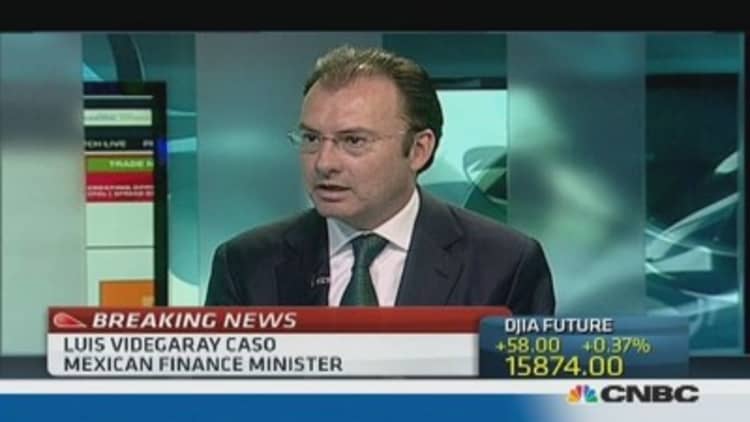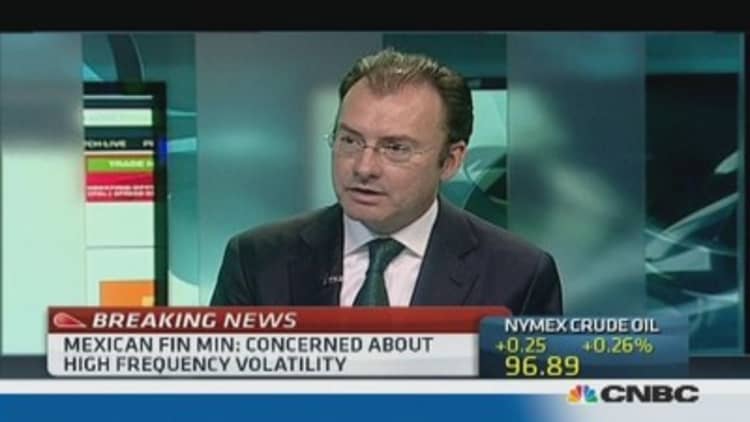
The U.S. Federal Reserve's scaling-back of its bond-buying program is good for Mexico, its finance minister told CNBC on Monday — despite the country being hit by the ongoing emerging market sell-off.
(CNBC Explains: tapering)
Like other emerging market assets, Mexican stocks continued to decline on Monday, amid fears of a slowdown in China and concerns the Fed will opt for further cuts to its monthly bond-buying program when it meets on Tuesday.
Shares on the benchmark Bolsa Mexicana de Valores were nearly 7 percent down on the week on Monday. The Mexican peso was less affected however, falling only 0.44 percent against the dollar over the same period.
(Read more: Who pulled the trigger on emerging markets?)

Mexico's Finance Minister Luis Videgaray Caso, however, said his country's close ties to the U.S. meant it would ultimately benefit from Fed tapering.
"Mexico is so much linked to the U.S. economy that it (tapering) is good news because it means the U.S. economy is really recovering," Caso told CNBC.
Caso added that market volatility was in large part due to uncertainty surrounding how fast tapering will progress, rather than concerns about tapering itself. The Fed will meet on Tuesday this week, and is expected to scale back its monthly asset purchases by another $10 billion.
(Read more: Mexico's moment in Davos)
Earlier this month, the World Bank said that Mexico's growth hinged on the U.S.'s economic recovery. It forecast the country's economy would grow by 3.4 percent in 2014, before accelerating to expand by 4.2 percent in 2016.
Caso was more optimistic, forecasting that structural and energy reforms would see Mexico grow by 5 percent per annum from 2016 onward.
(Read more: Jim O'Neill, who coined BRIC, moves to MINT)
In the near-term, Caso said there would be more differentiation between emerging markets, and that Mexico would benefit from this.
"We are not that exposed to Asia, particularly to China. Clearly some of the volatility we are seeing in our Latin neighbors is due to links to China," he said, explaining that only 4 percent of Mexican exports go to China.
His comments come after the governor of the Central Bank of Brazil said on Friday that the winding down of U.S. stimulus was no bad thing for emerging markets in general.
"The central bank of Brazil was one the first to say that the beginning of tapering is a global positive for the global economy, for international trade- and therefore for emerging markets, including Brazil," Alexandre Tombini said at a CNBC debate about the future of monetary policy in Davos.
Meanwhile, veteran economist Jim O'Neill described Mexico and Nigeria as the most appealing of the upcoming emerging markets he terms MINTs (Mexico, Indonesia, Nigeria and Turkey).
"Mexico is probably the most competitive producing nation in terms of low-valued-added stuff like autos," he told CNBC.
—By CNBC's Katy Barnato. Follow her on Twitter: @KatyBarnato

